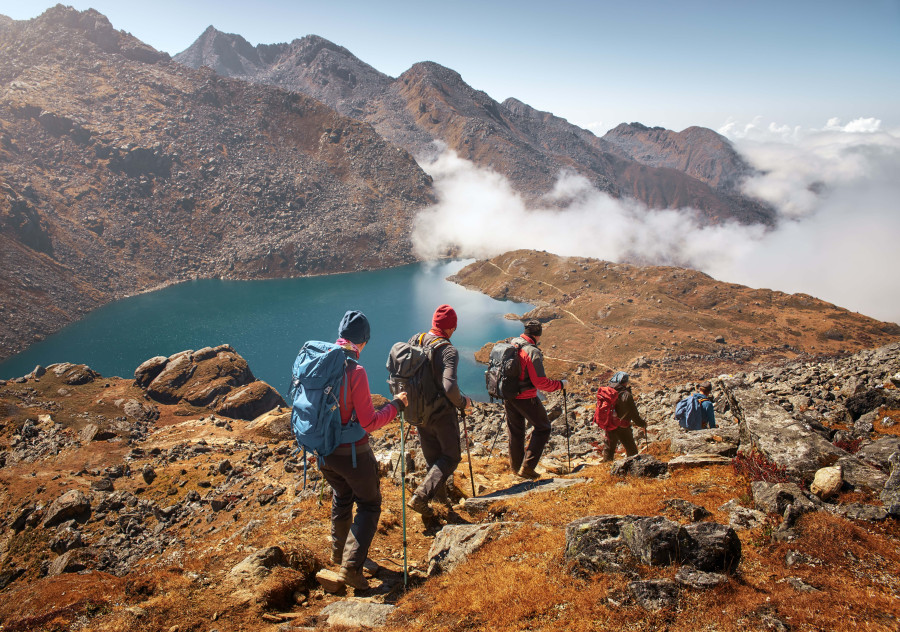Money
Sherpas rendered jobless by lockdown to be hired to clean up trekking trails
Hiking trails on the Kathmandu Valley rim like Shivapuri, Dakshinkali and Nagarkot will be connected.
Sangam Prasain
The government plans to create jobs for sherpas who were put out of work after the lockdown turned the spring mountaineering and trekking season into a wash-out by hiring them to repair and clean up trekking trails in the Himalaya.
Cleaning Everest will not be technically or financially possible this spring, officials said, so they will focus on trekking routes.
All Everest expeditions slated for this spring season were cancelled on March 12, and climbers and the Nepal Mountaineering Association suggested that the government turn the upset into an opportunity by mobilising tourism workers for an Everest clean-up campaign.
After the virus wiped out thousands of jobs, the association proposed that the unemployed sherpas be deployed to retrieve trash and dead bodies from the world’s highest mountain.
"We discussed the issue of cleaning Everest and reached a conclusion that it was not possible to begin the campaign immediately," said Danduraj Ghimire, chief of the Department of Tourism.
"It's not feasible from both perspectives—technical and financial," he said. "The campaign will require millions of rupees to pay the high altitude workers, and the equipment is also expensive. And during this crisis, the government does not have enough cash reserves," said Ghimire.
And technically, the government has to go through a mandatory tendering process to hire workers for the cleaning campaign, he added. "It takes at least 45 days to invite bids."
Everest needs to be cleaned up by May-end before the pre-monsoon sets in. "So we decided to clean the trekking routes this year," said Ghimire.
Tourism Minister Yogesh Bhattarai said during a video conference on Monday that the cleaning campaign was meant to keep tourism workers busy and provide them jobs during the post-crisis period too.
According to Ghimire, hiking trails on the Kathmandu Valley rim like Shivapuri, Dakshinkali and Nagarkot will be connected. Trekking routes like Manaslu and Kanchanjunga will also be repaired and spruced up.
"We have created different packages amounting to Rs8 million for this purpose."
Record numbers of climbers come to Everest every year to fulfil their lifetime dream to climb the world's highest peak. They leave behind tonnes of both biodegradable and non-biodegradable waste, including empty oxygen canisters, kitchen waste, beer bottles and faecal matter.
As a result, the world’s highest peak has acquired notoriety as the 'world's highest garbage dump'. Each camp on Everest is littered with depleted oxygen cylinders, food packaging and ropes.
Last year, climbers retrieved four bodies and collected some 11 tonnes of garbage from the mountain in the first-ever cleanup drive launched by the government. Ghimire said that the clean-up campaign last year was made possible by funding received from various private organisations.
According to mountaineering officials, it may cost $20,000 to $200,000 to bring down a dead body from extreme points.
Most climbers’ bodies are left behind on Everest every year as it is too costly and difficult to bring them down. Last year, nine people climbing from the Nepal side died on the rarefied slopes, the highest number of deaths in the past four years. Two people died on the Chinese side of the mountain.
The federal government makes millions every year in climbing permits. Foreigners pay $11,000 to obtain a permit and spend anywhere between $40,000 and $90,000 to climb Everest. The Department of Tourism collects around $4 million annually in royalties from Everest climbing permits.
Civil servants to get paid leave to revive tourism
Kathmandu: Tourism Minister Yogesh Bhattarai said that the government would launch a special travel leave concession package targeted at government employees.
"We want to keep the tourism industry busy by mobilising civil servants for domestic tourism promotion," he said during a video conference on Monday organised by the Society of Economic Journalists of Nepal.
According to him, the government will offer civil servants a month of paid leave to tour the country and revitalise the tourism industry.




 9.51°C Kathmandu
9.51°C Kathmandu















